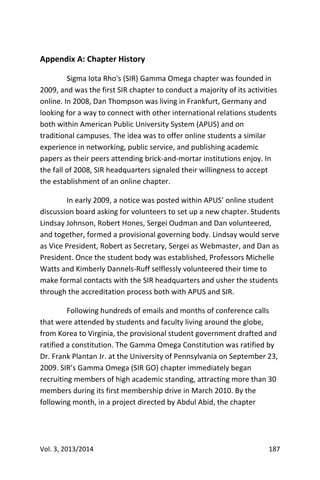This document discusses the political situation in Egypt following the Arab Spring uprisings, noting the initial hopes for democratic transition but also the challenges that have emerged, including instability, power struggles between political groups, and the military maintaining influence. It argues that Egypt's transition to democracy will be a long process that requires balancing various interests without endangering national security, and that both Mubarak and Morsi missed opportunities to foster unity and reform.
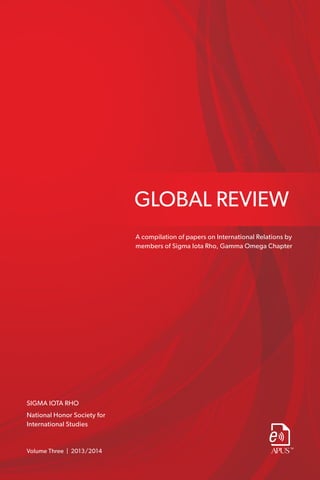






























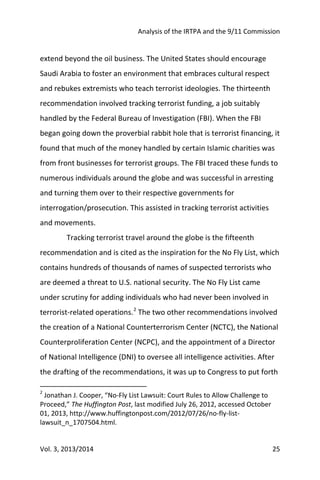

![Analysis of the IRTPA and the 9/11 Commission
Vol. 3, 2013/2014 27
internal changes in how it conducted intelligence activities. The FBI
created the National Security Division (NSD) but ignored a call for the
FBI to “allocate sufficient resources and authority to the new
Intelligence Directorate to perform its assigned mission.”4
The memo
further added that previous efforts by the FBI to create a National
Security workforce prior to the attacks on 9/11 had failed to launch and
that, “The [current] FBI Plan is inconsistent with the core
recommendation of the 9/11 Commission regarding the FBI.”5
The
Commission noted that it was not for lack of trying that the FBI goals
had not been met, but that the director of the FBI lacked the proper
authority to successfully integrate foreign intelligence collection,
analysis, and operations. This evaluation by the Executive Branch was
met by a rebuttal from the FBI, which responded with reciprocal
concerns over the danger of mixing criminal investigative matters with
intelligence gathering. The decision by the FBI to keep management
decisions within the organization has not changed since its
establishment. The Commission expressed the need to bring the FBI
completely into the role of intelligence, and not teeter the line between
criminal investigation and intelligence operation. Changing the
mentality of the FBI would be difficult, considering its success in the
criminal investigation role.
4
Commission on the Intelligence Capabilities of the United States Regarding
Weapons of Mass Destruction, Letter to the President, last modified March 29,
2005, http://govinfo.library.unt.edu/wmd/about.html.
5
Ibid.](https://image.slidesharecdn.com/93d94247-1ccf-43e3-8d20-6722a414cb0c-150429191515-conversion-gate02/85/GlobalReview-34-320.jpg)



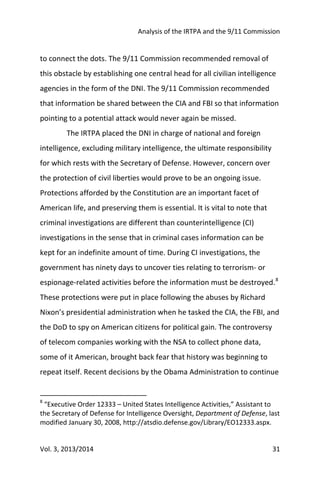

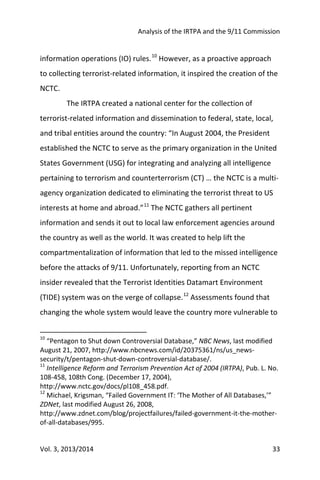



![Analysis of the IRTPA and the 9/11 Commission
Vol. 3, 2013/2014 37
Federal law regardless of Executive decision to do so. It would appear
that history had indeed come full circle in the form of the war on terror.
The impact this has had on the IC is damaging but not at all considered
grave. More reforms and increased oversight have reigned in
warrantless activities to a knee-jerk reaction by the White House.
The impact the IRTPA has had on the CIA, FBI, and DoD was
described in a progress report in May 2006. With regard to information
sharing, there has been a significant enhancement since the DNI was
emplaced. “The [chief information officer] is streamlining the processes
and organizations by which community elements acquire and manage
information technology and sharing, and is using designated authorities
to ensure that agencies build networks and databases that can support
rapid and efficient information-sharing, and to eliminate those that
cannot.”16
Improvement of analysis has shown progress as well.
Analysis of intelligence is considered the most important part of
the intelligence process. Analysts can de-conflict information coming in
from the field and send additional collection requirements that fill gaps
in the realm of intelligence. For example, current gaps exist in
intelligence coming in from Russia regarding the new Russian
President’s intentions with regard to foreign policy. The invasion of
Georgia was not a direct surprise, but it did catch intelligence officials
off guard with its timing and execution. Had proper intelligence gaps
16
Director of National Intelligence, “Report on the Progress of the Director of
National Intelligence in Implementing the ‘Intelligence Reform and Terrorism
Prevention Act of 2004,’” Federation of American Scientists, May 2006,
http://fas.org/irp/dni/implement.html.](https://image.slidesharecdn.com/93d94247-1ccf-43e3-8d20-6722a414cb0c-150429191515-conversion-gate02/85/GlobalReview-44-320.jpg)



















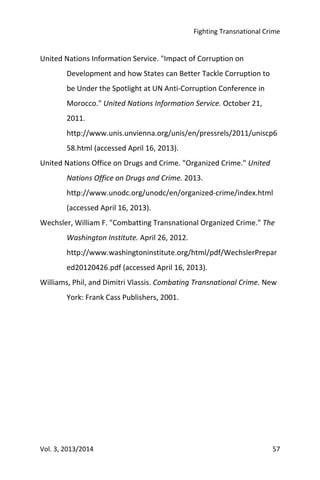



















![Vol. 3, 2013/2014 77
International Law and Human Trafficking
Ryan Jay Burch
Introduction
uman rights issues comprise what is often one of the most
overlooked areas of international law, as their effect tends to be
limited to individuals or areas that are not considered
strategically valuable. It is, therefore, easy for human rights
violations to be overlooked by organizations such as the United
Nations and individual countries. The times when human rights
violations become most noticed are when issues such as genocide are
brought to light, due to the sheer number of people involved. However,
there is another issue that involves a tremendous amount of victims–
human trafficking. The United States Department of Homeland Security
estimates that there are between 12 million and 27 million
enslaved/trafficked persons in the world (Department of Homeland
Security n.d.). The sad (and scary) truth is that “after drug dealing,
human trafficking … [is the] second-largest criminal industry in the
world” (Johnson 2010). People are trafficked for a variety of reasons,
including debt bondage, and forced labor in the domestic, agricultural,
restaurant, or construction fields, as well as the sex industry.
Oftentimes, human trafficking (or trafficking of persons) is thought of as
H](https://image.slidesharecdn.com/93d94247-1ccf-43e3-8d20-6722a414cb0c-150429191515-conversion-gate02/85/GlobalReview-84-320.jpg)




![Ryan J. Burch
Vol. 3, 2013/2014 82
trafficking in persons… requires a comprehensive international
approach in the countries of origin, transit, and destination that
includes measures to prevent such trafficking, to punish the traffickers
and to protect the victims of such trafficking, including by protecting
their internationally recognized human rights” (United Nations 2000).
This supplement is an important step to ensure all persons, especially
those who are most vulnerable (women and children), are able to be
recognized as victims and the perpetrators of the crimes punished.
Similar to the U.S. Immigration and Customs Enforcement
definition of human trafficking, the protocol defines the trafficking of
persons as “the recruitment, transportation, transfer, harbouring [sic]
or receipt of persons, by means of the threat or use of force or other
forms of coercion, of abduction, of fraud, of deception, of the abuse of
power or of a position of vulnerability or of the giving or receiving of
payments or benefits to achieve the consent of a person having control
over another person, for the purpose of exploitation” (United Nations
2000). Having a solid international definition of human trafficking, which
focuses on the exploitation factor, nations that don’t have national laws
related to trafficking and/or that have varying laws with less useful
definitions now benefit from having a mutually agreed upon standard.
Further, the Protocol demands that each state signatory criminalize the
act of trafficking of persons (United Nations 2000). Again, this goes a
long way, as states with lax laws are now required to criminalize
something that once may have been seen as a source of income for
them, despite the human rights issues.](https://image.slidesharecdn.com/93d94247-1ccf-43e3-8d20-6722a414cb0c-150429191515-conversion-gate02/85/GlobalReview-89-320.jpg)








![Will Israel Launch a Preventive Attack?
Vol. 3, 2013/2014 91
prospect that the opponent will acquire or develop a powerful new
offensive or defensive capability (2006, 7-9).
Iran is a signatory to the Nuclear Non Proliferation Treaty (NPT)
and has the right to obtain nuclear energy for peaceful purposes.
However, because of its continued violations of the safeguards
agreement with the International Atomic Energy Agency (IAEA) and NPT
dating back to 1983 (along with other suspect activity), Israel and the
permanent five members of the United Nations Security Council plus
Germany (P5 plus 1), now suspect that Iran is masking a nuclear
weapons program. In early 2009, Iran’s government declared that it
now controls the entire cycle for producing nuclear fuel (Associated
Press 2009). Moreover, the United States, United Kingdom, and France
recently revealed that Iran has a second uranium enrichment facility
next to a military base inside a mountain near the Holy City of Qom, a
fact that serves to confirm the Israeli fear that their suspicion with
regard to Iran’s intentions of acquiring a nuclear bomb holds true. As a
result, Israel has increased the pressure on Iran by making it clear that it
will not stand idly by and wait for Iran to acquire nuclear weapons and
by upgrading Armed Forces defensive and offensive capabilities with the
latest technology and equipment. Though it seemed that the added
pressure by the United States and the international community
motivated Iran to agree to a dialogue through the P5 plus 1 negotiations
in Geneva, Iran’s subtle tone of defiance still rings clear as its Parliament
has stated that “[It] will not compromise on its legitimate nuclear rights”
(Associated Press 2009). Currently, Iran is faced with robust sanctions](https://image.slidesharecdn.com/93d94247-1ccf-43e3-8d20-6722a414cb0c-150429191515-conversion-gate02/85/GlobalReview-98-320.jpg)

![Will Israel Launch a Preventive Attack?
Vol. 3, 2013/2014 93
Literature Review
Beres (2009) offers a comprehensive retrospective analysis
concerning Israel’s strategic policy in confronting the existential threat
posed by an Iranian regime focused on becoming a nuclear power.
Beres, along with the other six members of the study named “Project
Daniel”, recommended that “Israel take certain initiatives in removing
imminent threats. These included preemptive strikes against enemy
WMD development, manufacturing, storage, and control and
deployment centers” (Beres 2009, 495). Beres’ group further
recommended that Israel “do whatever is necessary to prevent enemy
nuclearization, up to and including pertinent acts of preemption” (Beres
2009, 504). One important observation made by the group was that
preemption would be most successful only against an enemy that had
not yet gone nuclear (Beres 2009, 506). This is a policy-related study
that draws its observations, analysis, and conclusions through a
qualitative approach. The study is further enhanced by the sound use of
preemptive war doctrine (Sun Tzu and The Art of War), empirical
analysis, and personal professional experience of the project members.
Though all members have personal ties to the Nation of Israel, most
concerns of biases are overshadowed by the group’s viewing of the
issues through a realistic lens of sound military doctrine and by their
“combining legal with strategic analysis [that] links the jurisprudential
concept of “anticipatory self-defense” to various preemption scenarios,
and to The National Security Strategy of The United States of America
(20 September 2002)” (Beres 2009, 493).](https://image.slidesharecdn.com/93d94247-1ccf-43e3-8d20-6722a414cb0c-150429191515-conversion-gate02/85/GlobalReview-100-320.jpg)


![Orlando Fonseca
Vol. 3, 2013/2014 96
perspective. As such, this work helps us understand Israel’s strategic
approach concerning Iran’s nuclear facilities through a scholarly and
objective lens.
Harel (2009) offers a timely analysis on Israel’s military
capabilities in confronting Iran’s nuclear facilities with preventive
attacks. He then examines the possible post-attack Iranian responses,
either directly or via proxies, such as Lebanon’s Hezbollah and Gaza’s
Hamas. Harel’s most important finding is that the Mossad may have
exhausted its efforts to further delay Iran’s nuclear programs, and that
at present, no action looms, other than a [preventive] attack that is
capable of preventing Iran from becoming a nuclear power. Harel’s
journalistic analysis is biased in that it paints a pessimistic outlook on
the possibility of a diplomatic breakthrough based on Israeli popular
sentiment. However, this analysis is important as it serves to measure
the level of impatience and anxiety existent in Israel with regard to the
Iranian nuclear issue. This analysis uses a qualitative approach based on
intuition and unclassified sources of information, and is both current
and pertinent.
Mueller et al. (2006) presents a thorough scholarly historical
analysis of the following Israeli preventive and preemptive attack case
studies: The Sinai Campaign of 1956, the Six Day War of 1967, the
October War of 1973, and the Osirak Raid of 1981. The study explores
the historical record, and compares and contrasts each of the cases’
situational settings, levels of threat, policy options, and resulting
outcomes. Mueller’s most important finding is that whenever Israel’s](https://image.slidesharecdn.com/93d94247-1ccf-43e3-8d20-6722a414cb0c-150429191515-conversion-gate02/85/GlobalReview-103-320.jpg)


![Will Israel Launch a Preventive Attack?
Vol. 3, 2013/2014 99
would not appreciably increase Washington’s ability to deter
Iran from launching a nuclear or conventional attack. It could
however, play into the hands of Tehran’s proxies by inflaming
anti American and Israeli sentiment and fanning civil unrest in
the Persian Gulf. Washington may also be tempted to further
undermine Iran’s economy by imposing broad based economic
sanctions. (2010, 11)
The above measures would adversely affect Iran’s citizens and not the
leadership within the government. Lindsay and Takeyh exhort that
Washington should resist any urge to sign mutual security
treaties with Arab countries in the Middle East. [Rather], an
alliance of sorts would secure all the benefits of a region-wide
commitment to deterrence without exposing the United States
and its allies (Israel) to the complexities of formal bilateral or
multilateral security treaties. Containment would not be a
substitute for the use of force. To the contrary, its success
would depend on the willingness of the United States [and
Israel] to use force against Iran or threaten to do so should Iran
cross Washington’s red lines. (Lindsay and Takeyh 2010, 11-12)
Israel’s responses, however, will hinge on how it perceives
United States’ actions or inactions toward the existential threat posed
by a nuclear armed Iran. According to Alon Ben-Meir, Israel’s national
resolve to act unilaterally against Iran hinges on the following facts: The
first is if Israel concludes that stern sanctions and other behavior-
changing tactics taken by the international community have failed to
produce improved results. The second is if Israeli intelligence
unequivocally confirms, “that the Iranian [nuclear] threat is deemed
imminent, and no one else is willing to act. Under these circumstances,](https://image.slidesharecdn.com/93d94247-1ccf-43e3-8d20-6722a414cb0c-150429191515-conversion-gate02/85/GlobalReview-106-320.jpg)






![Orlando Fonseca
Vol. 3, 2013/2014 106
Mohammad Reza Shah Pahlavi, a friend and ally of the United States for
many years after the Iranian Revolution of 1978 has also confirmed the
conviction that the United States is not dependable (Mokhtari 2005,
225). In an article titled “Iran and the Shah. What Really Happened,”
James Perloff best describes how the United States government, under
the Carter administration, betrayed the Shah, an alleged ally. Perhaps
the words of the Shah himself could shed some light on Iranian
perceptions of Western powers. He wrote that
in 1973 we succeeded in putting a stop, irrevocably, to sixty
years of foreign exploitation of Iranian oil resources … In 1974,
Iran at last took over the management of the entire oil industry,
including the refineries at Abadan and so on … I am quite
convinced that it was from this moment that some very
powerful, international interests, identified, within Iran, the
collusive elements which they could use to encompass my
downfall.” (Perloff 2009, 6)
Iraq’s invasion of Iran, Arab and U.S. support for the invader, and the
stunning silence of all when Iraq used chemical weapons against
Iranians, [further served to convince the Iranians that its national]
interests had to be safeguarded by Iranians and Iranians alone”
(Mokhtari 2005, 225-226).
Economics
Despite high international oil prices in recent years, the
contribution of the oil and gas sector to economic growth has been
more modest. Iran’s oil economy has been faced with low levels of
production and inadequate investment. United States and U.N.
sanctions imposed against Iran, along with the poor domestic business](https://image.slidesharecdn.com/93d94247-1ccf-43e3-8d20-6722a414cb0c-150429191515-conversion-gate02/85/GlobalReview-113-320.jpg)

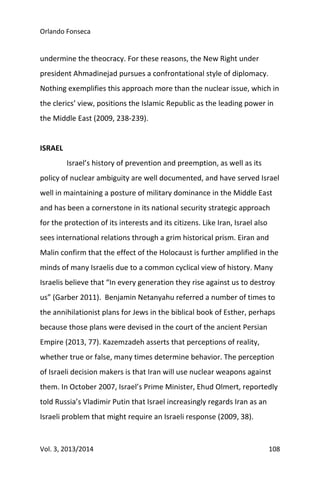



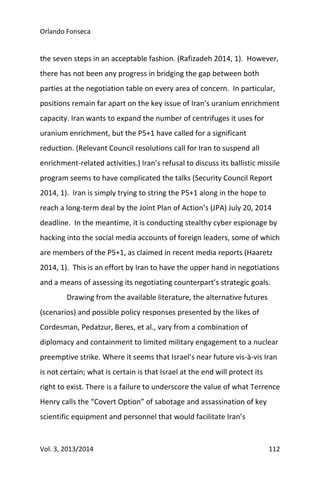













![Jo McIntire
Vol. 3, 2013/2014 126
of a vulture) (Sosa 2002, 170-1); the "barbed wire" Pinochet of Chile
(Sosa 2002, 173); the "cerdísimo" (His Most Swinish Excellency) Rafael
Leonidas Trujillo of the Dominican Republic - "hated by the living, hated
by the dead" (Sosa 2002, 174-5); and Efrain Rios Montt the "Boa
Anaconda" of Guatemala (Sosa 2002, 178). These men were, after all,
not abstractions but real human beings. Sosa unabashedly declares war
against them all. He does not hesitate to draw the ties between the
dictatorships of Latin America and the United States' political/economic
interests. In "Fué en el año 32. Y no hay olvido6
," Sosa takes aim at
Franklin D. Roosevelt whose "bleary eyes . . . shone with maximum
splendor" at the news of campesino deaths (Sosa 2002, 177). In "La casa
de la piedras puntiagudas" (the house of pointy stones), Sosa focuses on
the tragedy of Honduras. "The History of Honduras," he writes, "can be
written on a gun / on a bullet wound, or rather, inside a drop of blood"
(Sosa 2002, 159). Indeed, dictatorships shredded Latin American society
for several decades.
In November 2009, Sosa wrote a cover story for The
Progressive, one of the leading voices for peace and social justice in the
United States, denouncing the middle-of-the-night abduction of
President Manuel Zelaya and the successive coup. Zelaya was a popular
president. In the article, Sosa refers to Roberto Micheletti and General
Romeo Vásquez, who together seized power, as "the two-headed
monster" (2009)., "They [the military] are thrilled to be smelling blood
again," he wrote (Sosa 2009). The coup was a "coronation of death"
6
It was in the year 32. And there is no forgetting.](https://image.slidesharecdn.com/93d94247-1ccf-43e3-8d20-6722a414cb0c-150429191515-conversion-gate02/85/GlobalReview-133-320.jpg)




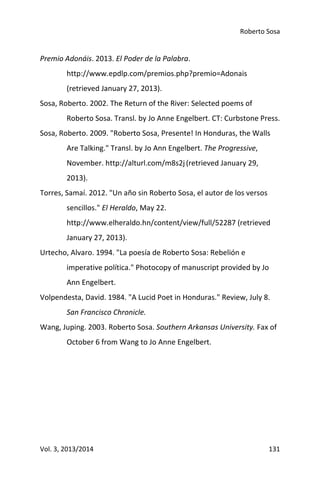







![China’s Commitment to Foreign Aid
Vol. 3, 2013/2014 139
Ventures and Cooperative Projects, and the expanded role of low-
interests loans financed through the Export-Import Bank of China.12
China’s final phase of foreign assistance transition began at the
turn of the century. The State Council Information Office of the PRC, in
China’s first public release of its foreign aid policy, cited, “On the basis
of sustained and rapid economic growth and enhanced overall national
strength, China’s financial resources for foreign aid have increased
rapidly, averaging 29.4 percent [of its annual budget] from 2004 to
2009.”13
This increase was coupled with an annual growth rate that
averaged 10 percent during the same time period. China’s foreign
assistance has expanded to include aid projects arranged, not only
bilaterally, but through multinational and regional associations.
Ministries, Organizations, and Elements of China’s Aid
The majority of developed donor nations have established
independent agencies whose focus is dedicated solely to bilateral
foreign aid programs; an example is the United States Agency for
International Development (USAID). China’s bilateral foreign aid
program is directed by the Department of Aid to Foreign Countries, a
department within its Ministry of Commerce (MOFCOM). This marriage
of foreign aid and commerce was not an accident. During the infancy of
the PRC, aid was primarily in the form of material goods and was
controlled by the Ministry of Foreign Trade. In March of 1982, the NPC
restructured and merged the Ministry of Foreign Trade, the Ministry of
12
Ibid.
13
Ibid.](https://image.slidesharecdn.com/93d94247-1ccf-43e3-8d20-6722a414cb0c-150429191515-conversion-gate02/85/GlobalReview-146-320.jpg)















































